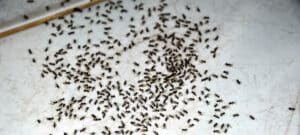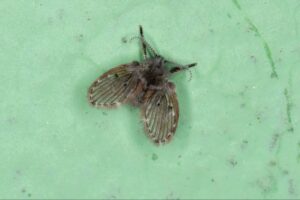Home / Blog / Scorpions / What Do Scorpions Eat: Do You Need to Worry?
What Do Scorpions Eat: Do You Need to Worry?

Scientifically reviewed by Rachel Maldonado
-Published on May 17, 2024
-Updated on August 30, 2024
What Do Scorpions Eat: Do You Need to Worry?
Scorpions, with their menacing pincers and a tail poised to deliver a painful sting at any moment, have long been a symbol of fear and danger.
But what exactly are these nighttime hunters on the prowl for it? Just what is it that a scorpion considers a midnight snack, and could that include you?
Whether you live in a bustling urban environment or a desert oasis, understanding a scorpion’s diet is the first step to safeguarding your home against these enigmatic arachnids.
Let’s take a closer look at a scorpion’s diet to give you a better idea of how to prevent them from becoming a problem in your home, business, or garden.
A Peek Into A Scorpion’s Menu

Scorpions are not picky eaters; they are practical opportunists, eating what is available and manageable.
Insects make up the primary diet of most scorpion species. Crickets, beetles, and cockroaches are commonly on the menu. In some cases, larger scorpions might eat lizards, mice, and snakes. As carnivores (mostly insectivores), they do not eat plants.
Should the opportunity arise, scorpions won’t hesitate to feast on fellow arachnids, including spiders and even other scorpions, either.
The good news? Contrary to popular belief, scorpions are not out to hunt humans. They generally will not attack unless provoked or they feel threatened. Their venom is primarily intended for subduing prey, not for humans.
However, in some rare cases, scorpions might sting if they mistake a human as a potential threat.
Of course, as with any pest, food is not the only necessity for survival. Scorpions source a significant amount of their hydration from the fluids of their prey, reducing their reliance on finding open water sources and giving them an edge in arid environments.
Protecting Your Home Against Scorpions
If you’re a homeowner in a scorpion-prone area, you must take preventive measures to deter these creatures from entering your living spaces. Although most varieties of North American scorpions aren’t venomous (with the exception of some scorpions found in the southwestern deserts of the United States), they can still inflict a painful sting.
Understanding their behavior and biology is crucial in implementing effective prevention strategies.
Seal Up Entryways
Here’s one simple fix to keep in mind when you’re trying to prevent scorpions from becoming a problem: seal up entry points.
Scorpions are adept at squeezing through tiny cracks and crevices in search of food and shelter. Sealing up potential entryways, such as gaps around doors and windows, helps keep these invaders out.
Eliminate Access to the Buffet
A scorpion’s presence hints at another problem you might have without even realizing it – an abundant food source. You can reduce populations of insects by keeping a clean and tidy home, sealing food containers, and promptly fixing any leaks that could attract pests.
Get Rid of Outdoor Lighting
Insects are attracted to UV outdoor lighting, which, in turn, can lure scorpions closer to your home. While you might appreciate the ambient atmosphere of your outdoor lights, consider switching to yellow bug lights that are less attractive to insects and, consequently, scorpions.
Landscape With Safety in Mind
Maintain a tidy and uncluttered yard. Remove piles of debris, firewood, and rocks, which can serve as hiding spots for scorpions. Also, keep vegetation trimmed, and avoid letting trees or shrubs touch the home, providing them easy access to the roof.
When to Call the Pros
Sometimes, dealing with scorpions on your own is beyond your scope. Professional pest control services like Hawx have the experience and equipment needed to manage infestations with minimal risk to the environment or to human inhabitants.
Local pest control services understand the scorpion species native to your region and can tailor treatment plans to best manage that particular threat.
Not only that, but experts can guide you on how to make your property inhospitable to scorpions in an eco-friendly manner. This advice often includes habitat modifications and repellents that deter scorpions without harming the ecosystem.
Finally, know that indoor infestations and encounters with more venomous species warrant an immediate response from a professional pest control service. Your own personal safety should never be compromised in dealing with potentially dangerous pests like scorpions.
Key Takeaways
Understanding what scorpions eat is essential for managing the potential risks they may pose to your home and your family.
While scorpions are not typically out to make a meal of humans, their presence suggests a larger pest issue that needs addressing. By taking simple yet effective precautions, you can maintain a scorpion-free living space.
Remember, knowledge is power – and in this case, it could be the difference between a quiet night’s rest and a surprise encounter with an unwanted scorpion.
A proactive stance on home maintenance and cleanliness can significantly reduce the appeal of your environment to scorpions and the prey they follow as a result. And if the situation calls for it, don’t hesitate to call in the professionals.
Your home should be your sanctuary, and here at Hawx, we want to make sure it stays that way. Give us a call to join our own family of satisfied customers today.
Related Articles
Visit our blog to learn more.
→





